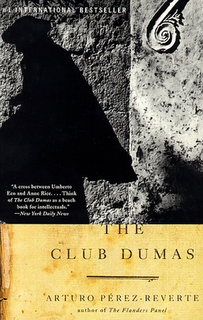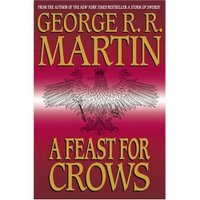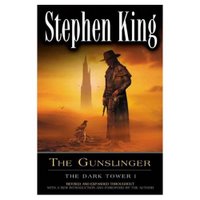 One of the things I enjoy most about reading is exploring new locales, finding cities, countries, and entire worlds that I'm only able to visit through the pages of a book. I like many of these places so much that I'll return again and again (Middle Earth, Narnia, the twisted America that Stephen King created in The Stand and co-created with Peter Straub in The Talisman), but it's always very pleasing to me to find new places that I enjoy, which is why the book that I've just finished and the two I'm about to read are so interesting to me.
One of the things I enjoy most about reading is exploring new locales, finding cities, countries, and entire worlds that I'm only able to visit through the pages of a book. I like many of these places so much that I'll return again and again (Middle Earth, Narnia, the twisted America that Stephen King created in The Stand and co-created with Peter Straub in The Talisman), but it's always very pleasing to me to find new places that I enjoy, which is why the book that I've just finished and the two I'm about to read are so interesting to me.Arturo Pérez-Reverte's The Club Dumas is a strange novel. It is a mystery-thriller whose protagonist, a finder and procurer of rare books, is rather difficult to like. It deals with the life and works of Alexandre Dumas, most specifically his works about The Three Musketeers, drawing strange parallels throughout the story to charcaters and scenes from Dumas' books. It also deals with the occult, demonology, and may or may not include a character who is Satan incarnate. In it basest form, it's somewhat like the Da Vinci Code, but much unlike DVC, it is beautifully written, in spite of being translated from its original Spanish. Many of these things would be enough on their own to get me to read the book, but what I found as I read was what really drew me into the book was the setting. The Club Dumas takes place in a shadowy, nebulous post-war Europe. No exact time frame is ever given beyond a few pop culture references thrown about the book, but because of the occult themes, Pérez-Reverte is able to give the reader the sense that the action may even be occurring outside of time, that very often the characters step back and forth through the centuries to accomplish their goals. There is a very real sense of how old Europe is in comparison to our young country, and even as subtly as it is added to the story, it gives some very real dramatic weight to what could otherwise be a strange and difficult story. It's Europe as it could be, if one or two things were slightly different. And that, as you'll see, will be the theme here.
 George R.R. Martin's A Feast for Crows is the fourth book in his epic fantasy series, A Song of Ice and Fire. This is no Middle-Earth, however. Martin's Seven Kingdoms and the surrounding world are rather loosely based on European geography, and although dragons and magic figure into the story, they are mostly background and history, the dying whispers of a forgotten world. No elves and goblins (and only one dwarf, a human dwarf) figure into this story. The Ice and Fire saga is the story of men and women of several families who vie for power as the kingdom falls apart around them. Martin has woven a rather large tapestry with almost 20 main characters and a host of supporting players (easy to do when each of your volumes averages near 1000 pages), and he's given each one enough depth to keep them all interesting... while they last. One of the things I enjoy most is that no one is safe. Just when you've come to like a character and understand their predicament, bang! A suprise attack or a poisoned cup of wine, and the body count rises. But again, I find myself drawn to the sort of alternate Europe where the story takes place. It could have been like this 8 or 900 years ago, if there were ever dragons and giants. It's not to hard to imagine our ancestors suffering through many of these types of situations. But it's close, and the idea that these people almost existed, that they could have done these things in some far-off time in our history, is very appealing.
George R.R. Martin's A Feast for Crows is the fourth book in his epic fantasy series, A Song of Ice and Fire. This is no Middle-Earth, however. Martin's Seven Kingdoms and the surrounding world are rather loosely based on European geography, and although dragons and magic figure into the story, they are mostly background and history, the dying whispers of a forgotten world. No elves and goblins (and only one dwarf, a human dwarf) figure into this story. The Ice and Fire saga is the story of men and women of several families who vie for power as the kingdom falls apart around them. Martin has woven a rather large tapestry with almost 20 main characters and a host of supporting players (easy to do when each of your volumes averages near 1000 pages), and he's given each one enough depth to keep them all interesting... while they last. One of the things I enjoy most is that no one is safe. Just when you've come to like a character and understand their predicament, bang! A suprise attack or a poisoned cup of wine, and the body count rises. But again, I find myself drawn to the sort of alternate Europe where the story takes place. It could have been like this 8 or 900 years ago, if there were ever dragons and giants. It's not to hard to imagine our ancestors suffering through many of these types of situations. But it's close, and the idea that these people almost existed, that they could have done these things in some far-off time in our history, is very appealing. And finally, a little closer to home, is Stephen King's Dark Tower series, beginning with The Gunslinger. I've started these books before, having read the first four volumes at least once each, but they always left me unfulfilled (mainly because I knew I had to wait for the end of the story). But having just re-read The Stand, and knowing that King finally completed the seven-book Dark Tower cycle, I decided to go back and give it another shot. In many ways, The Stand and The Dark Tower are similar. King himself has written that both were heavily influenced by Lord of the Rings, that the idea of a quest appealed to him, but that he wanted to make it his own, set in his own place with his own type of characters, and not just a pale imitation of Tolkien. And both stories take place in an America not unlike our own. We're just one plague (and a couple of allegorical angels and demons) away from living out the action of The Stand. The Dark Tower goes a little further away from America as we know it into what's clearly an alternate world, but some of the characters originate from our world (or King's version of it), and even in the Gunslinger's world, there are things we as readers can easily recognize. King even goes so far as to refer to The Stand and a few of his other works during the course of the Dark Tower books, hinting at an underlying thread that binds his entire ouvre together (or at least the more fantastical works in his canon). I'm curious to see what effect this series has on me this time, now that I can read it the whole way through. I've always enjoyed this side of King's work, and it will be interesting to see how he chose to finish it.
And finally, a little closer to home, is Stephen King's Dark Tower series, beginning with The Gunslinger. I've started these books before, having read the first four volumes at least once each, but they always left me unfulfilled (mainly because I knew I had to wait for the end of the story). But having just re-read The Stand, and knowing that King finally completed the seven-book Dark Tower cycle, I decided to go back and give it another shot. In many ways, The Stand and The Dark Tower are similar. King himself has written that both were heavily influenced by Lord of the Rings, that the idea of a quest appealed to him, but that he wanted to make it his own, set in his own place with his own type of characters, and not just a pale imitation of Tolkien. And both stories take place in an America not unlike our own. We're just one plague (and a couple of allegorical angels and demons) away from living out the action of The Stand. The Dark Tower goes a little further away from America as we know it into what's clearly an alternate world, but some of the characters originate from our world (or King's version of it), and even in the Gunslinger's world, there are things we as readers can easily recognize. King even goes so far as to refer to The Stand and a few of his other works during the course of the Dark Tower books, hinting at an underlying thread that binds his entire ouvre together (or at least the more fantastical works in his canon). I'm curious to see what effect this series has on me this time, now that I can read it the whole way through. I've always enjoyed this side of King's work, and it will be interesting to see how he chose to finish it.I watched In Harm's Way this morning on Turner Classic Movies. Odd for a lot of reasons: I've barely watched any TV since I moved out here, I'm not much of a John Wayne fan, and I usually don't have a whole lot of patience for the snail's pace of old movies, being from the MTV generation and all. But for some reason, I got sucked in this morning, and I found myself fascinated by the strange morality of the film. Here's a movie that was made in 1965, obviously a very different and tumultuous time in our country. But I found the messages in the movie to be very odd and oppositional. First, there's the characters. Wayne's character is put forth as a shrewd military hero, yet he also chose the Navy over his wife and 4-year-old son, abandoning them when he received an overseas commission. (In his character's defense, he later discovers his son has joined the Navy, and spends much of the movie trying to reconcile.) Kirk Douglas is Wayne's chief of staff, an alcoholic ladies' man who frequents a local brothel, rapes Wayne's son's fiancee in a drunken rage (causing her to commit suicide when she finds out she's pregnant), and then "redeems" himself by taking a plane on a suicide mission to warn the naval base of an impending surprise attack. Complex, to say the least, but no time is ever spent explaining why they are the way they are. And no characters spend much time on emotion. Grief, pain, anger, and joy all flash by in a moment, then it's on to the next scene. After Wayne tells his son of his fiancee's death, it takes all of 20 seconds before they're smiling and shaking hands. All of this got me thinking about ways that our society has changed in the past 40 years. If this 3-hour movie were made today, it would have ended up being a miniseries because so much time would have been spent explaining that Wayne's father was a hard-ass military man himself, and that Douglas was abused as a child and tortured by his personal inner demons, which caused him to go on his drunken rampage, and Wayne and his son would have a touching reconciliation involving some tears and man-hugs. Otherwise, moviegoers would never be able to handle the movie because there would be too much external guilt about the characters' actions, and test screenings would reject them as "unrelatable" or "unlikeable" or some such crap. In many ways, Americans as a people have become too sensitive and self-centered, a fact many men's magazines (like Esquire) have been happy to remind us of lately, bemoaning the lack of "men's men". We've bought into the Oprah/Dr. Phil line of thinking, and we spend so much time these days examining our feelings and how they effect the people around us, sometimes I wonder if we're letting our lives pass us by. Having a better sense of our own personal psychology hasn't seemed to improve the world much. There are still the same old problems there' have always been. Superficially, things seem to be headed back in the other direction. Fashion is beginning its slow turn back toward the 50's and 60's, bringing suits and dress clothes back to the workplace, and drinks and music have all had their passing retro fads. I wonder if this is a precursor to a shift in attitudes, if society is growing tired of touchy-feely, everybody's a winner-type thinking. Some days, it seems like it would be nice if everybody just quit whining, grow up, and start acting like adults and parents. The whole Grups thing is only gonna take you so far.
Eh. I think I had a point when I started writing that, but it just turned into a rant. Grump, grump. I think I'm ready to go back to work.
No comments:
Post a Comment